
Liver Care 101: Herbs, Foods, And Wellness Practices For The Liver
The importance of holistic liver care cannot be underestimated. Your liver is one of the most multi-functional organs in your body, silently performing a myriad of tasks on a daily basis. Some of your liver’s functions include:
- Detoxification: Converts drugs and other toxic substances into substances that can be more easily excreted through your urine and other eliminatory channels.
- Protein metabolism: Produces a number of amino acids—the building blocks of protein.
- Fat metabolism: Produces bile and bile salts, which are critical for digesting fat and for the absorption of fat-soluble vitamins.
- Carbohydrate metabolism and blood sugar balance: Helps regulate your blood sugar by converting excess glucose into glycogen—an energy form that can be saved for later use.
- Vitamin and nutrient storage: In addition to storing glycogen, your liver stores fat-soluble vitamins, such as A,D, E, and K.
- Blood storage: Contains 10-15% of your blood at any given time.
(Herlihy, 2011; Keown, 2014)
As you can see, your liver does so much for you! If all goes well and you support your liver as much as it supports you, you will reap the rewards of clear skin, good energy, strong digestion, and a healthy immune system. However, if your liver is lacking in support, you may notice signs of compromised detoxification function, such as skin breakouts, sluggishness, trouble digesting fats, menstrual disturbances, and even increased inflammation, irritability, and allergic responses due to a buildup of metabolic wastes and the fact that your liver is largely responsible for breaking down histamine (Keown, 2014). This article will outline key holistic liver care practices so that your liver can continue to perform as a detoxification and metabolic superstar.
5 Lifestyle Practices for Liver Support
When it comes to holistic liver care, it’s not just about the right foods and herbal supplementation. A supportive lifestyle is one of the number one tools for achieving optimal liver health. Here are five important lifestyle tips that Ayurvedic practitioner Mary Thompson (2019) offers for nourishing your liver.

1. Allow 3 Hours Between Dinner and Bedtime
In order for the liver to do its proper clean up job at night, it needs you to be sleeping. If you have a meal or a calorie-containing beverage (especially an alcoholic one) late at night, your liver has to focus on digesting and filtering that meal or beverage versus concentrating on cleanup. The result is that your insides never really get cleaned out as they should, which results in a sluggish, overburdened liver.
2. Have an Ample Lunch and a Light Supper
In order to let the liver do its night time cleanup job, Ayurveda advises that you have a larger lunch and a smaller, lighter supper meal. Ayurveda teaches that our agni, or digestive fire, waxes and wanes with the daily patterns of the sun. When the sun is at its hottest and highest around midday, that is when our digestive fire is considered to be the strongest. When the sun goes down in the sky, our digestive fire is not as strong, and thus we should eat a little lighter. Also, by allowing 3 hours between your last meal and bedtime, you give your body a chance to digest that last meal of the day so that the liver’s main overnight task is clean up and filtration, as it should be.
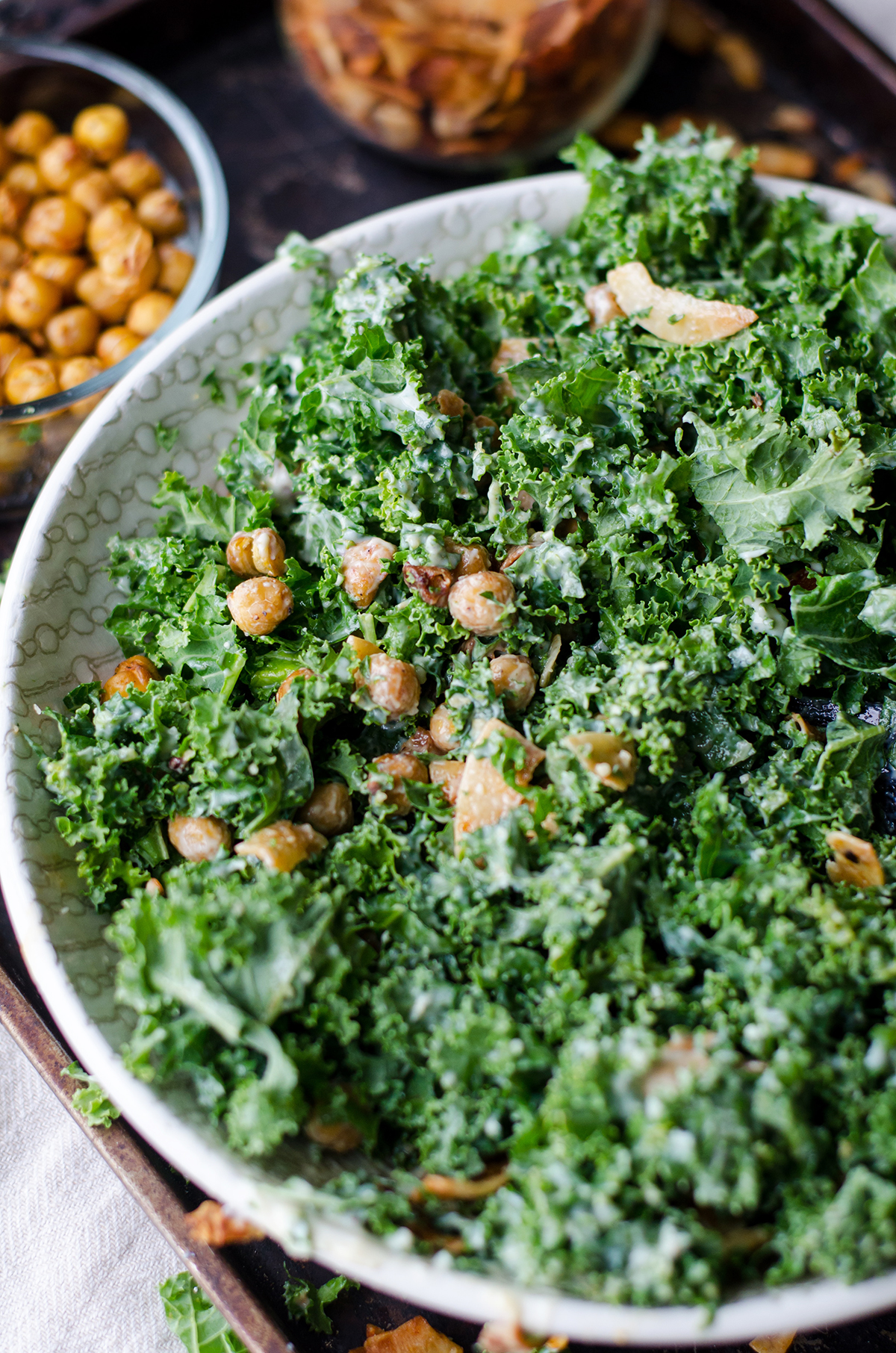
If you find it challenging to have a large lunch and very small dinner, at least work on having those two meals be moderate and similar in size. For some of us, it’s hard to get a big meal down in one sitting, so our calories need to be a little more spread out during the day. This is fine. Just be sure to not overeat at night and to allow a few hours for your body to digest before going to sleep. Also, by focusing on lighter foods such as vegetables, soups, and stews at night, you will ease the burden on your liver and digestive system.
3. Avoid Needless Snacking
This holistic liver care guideline follows similar logic as the one prior. If your body is constantly in digestion mode, it is impossible for it to complete its clean up tasks. Think about it like trying to wash a sink full of dirty dishes when someone keeps adding more and more dishes to the pile. It makes it impossible to get the job done. When we are constantly snacking, this is what we put our liver and entire digestive system through—an endless and impossible clean up job. Therefore, for good liver health, it is advised to allow at least 3 hours between eating (this includes calorie-containing beverages as well). Even for those who need to eat frequently, a 3 hour window should be attainable as long as each meal contains protein, fat, and fiber. This will help make the meal last longer by slowly dispersing energy supplies versus causing a blood sugar spike as in the case of low fat, low fiber, high glycemic meals (Palanisamy, 2015).

4. Release Stress Daily
Stress hormones compete with the liver’s filtration system. Remember that the liver is your master filter. In addition to shuffling and deactivating harmful substances that you may imbibe, the liver also filters and deactivates your body’s own chemicals, such as estrogen, histamine, and stress hormones such as cortisol. This is the liver’s rightful job. However, when your body is constantly stressed, you give your liver a more onerous task. Therefore, an excellent holistic liver care practice to incorporate daily includes stress-releasing activities such as moderate to vigorous exercise, yoga, mindfulness, time in nature, and creative hobbies.

5. Drink Plenty of Water, and Minimize Coffee, Alcohol, and Fried Foods
Staying hydrated by drinking ample water and hydrating beverages such as coconut water and broth is key in holistic liver care. This vital holistic liver care practice will assist your liver and kidneys with their detoxification job. Your liver works like a janitor, breaking down drugs, fats, and harmful substances in your body. By consuming fewer intoxicating substances and hard-to-digest fats, such as the trans fats found in greasy fried foods, you ease the burden placed on your liver. Also, Ayurveda teaches that greasy foods, coffee, and alcohol are heating and aggravate pitta dosha. Since the liver is a pitta organ, it makes sense to keep pitta cool by minimizing these substances.
Bitter is Better: Whole Foods for Liver Support
Bitter foods are especially supportive for the liver. Ayurveda teaches that the liver is a pitta organ, meaning that it has a close connection to pitta dosha, and that liver imbalances are often linked to a pitta excess. Foods and herbs with a cool energy and bitter taste are advised in order to reduce and pacify pitta dosha. Interestingly enough, Western herbalists seem to agree that bitter foods and herbs are beneficial for the liver. Examples of bitter foods that are great for holistic liver care include dark, leafy greens, especially dandelion greens and beet greens. However, all leafy greens are helpful. Also, the cabbage family plants, such as broccoli, kale, Brussels sprouts, and cabbage are powerful tools in assisting liver detoxification and should be included in any holistic liver care plan as well (Palanisamy, 2015).
It may surprise you to learn that eggs, garlic, leeks, and onions are also vital for liver detoxification as they assist in phase II liver detoxification. During phase II liver detoxification, wastes are conjugated into water-soluble byproducts that can be excreted via urine and stool. So, eggs and greens with a little onion or garlic are a wonderful meal for your holistic liver care plan (Palanisamy, 2015)!
Liver-Loving Herbs
Herbs are the icing on the cake when it comes to holistic liver care. While a supportive lifestyle and good dietary choices are the foundation of holistic liver care, herbs give that extra boost of support in maintaining and regaining liver balance. While there are a plethora of herbs that support good liver health, we will look at a handful of the most prominent.
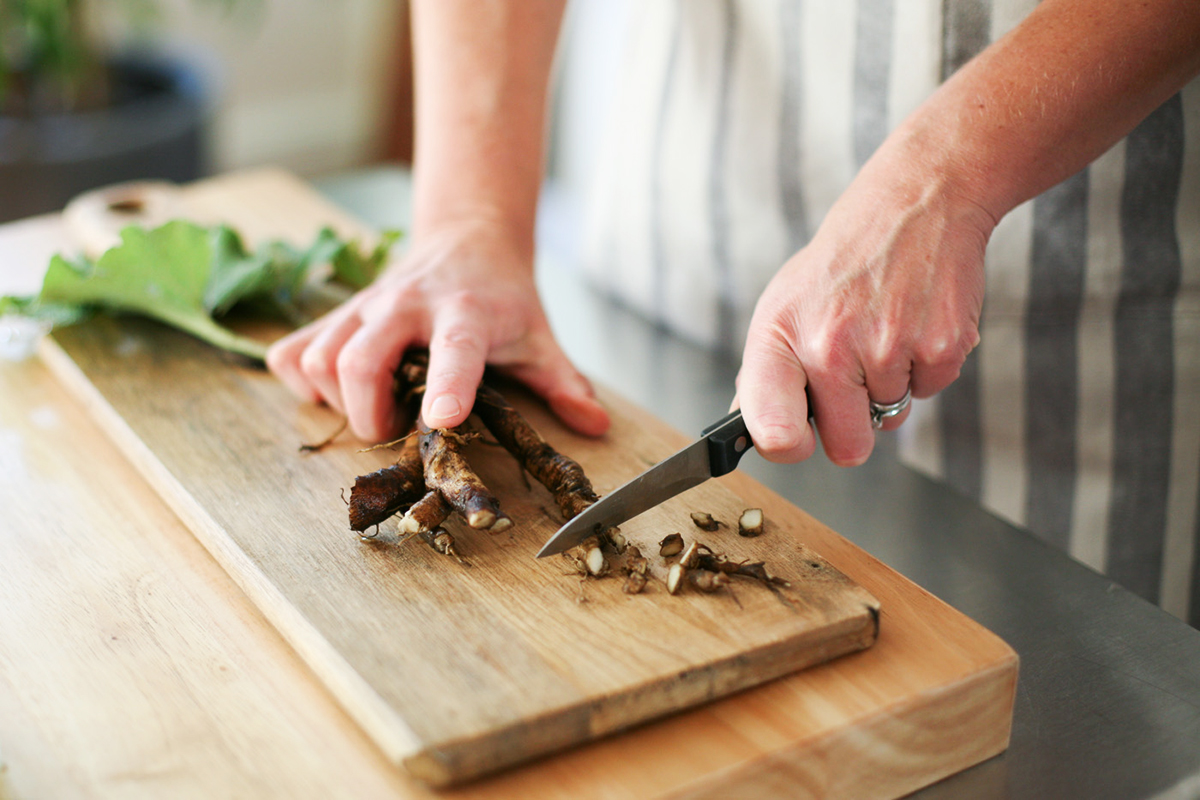
Burdock (Arctium lappa) root
Burdock root is a liver mover, meaning that it helps ease a sluggish liver by encouraging bile excretion and production. In addition to providing holistic liver support, burdock contains inulin, a fiber which nourishes healthy gut bacteria. Burdock is classically recommended for skin issues, digestive troubles, detoxification support, arthritis, and other symptoms that indicate less than stellar liver function (Groves, 2016). Burdock root can be taken daily in the amount of 3-9 grams as a decoction, infusion, or tincture (Dass, 2013).
Guduchi (Tinospora cordifolia) stem
Guduchi stem has deep roots in Ayurveda. Another name for guduchi is amrit, which translates to nectar. The name amrit is indicative of guduchi’s vast rejuvenating powers. In fact, it is considered one of the best rejuvenating herbs when working with pitta imbalances and problems relating to the liver and immune system. The berberine and other alkaloids in guduchi help burn ama (metabolic wastes). Guduchi is traditionally used for soothing liver and spleen disorders, burning sensations, skin issues, and headaches (Dass, 2013). As part of a holistic liver care program, guduchi can be taken in the amount of 3-15 grams per day as a decoction, herbal infused ghee, or powder (stirred into hot water or hot milk) (Dass, 2013).
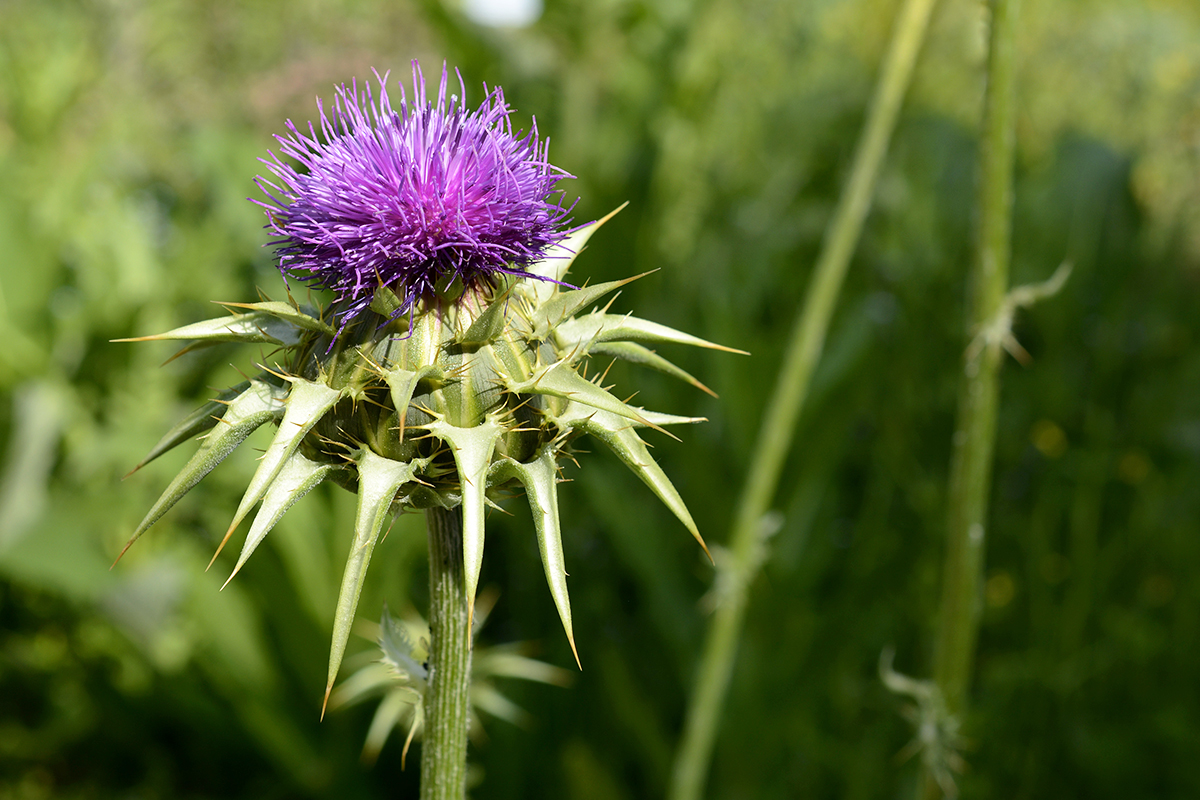
Milk Thistle (Silybum marianum) aerial parts
Milk thistle is one of the most well-respected liver protectors. Milk thistle defends the liver against even the most extreme toxins and also pacifies a range of liver conditions, such as cirrhosis, fatty liver, and hepatitis (Groves, 2016). Ayurveda considers milk thistle to be useful in enkindling the digestive fire of the liver, which is key in overall digestive strength (Dass, 2013). Herbalist Maria Noel Groves recommends that milk thistle be taken as a standardized pill extract (take according to the manufacturer’s instructions) because this is the best way to get the full benefits of its constituents (Groves, 2016).
Dandelion (Taraxacum officinale) root
Dandelion root is a nutritive liver mover. The leaves are generally used for kidney support and have a diuretic action, whereas the root is a wonderful asset in holistic liver care. The dried root can be taken as a tincture, decoction, or roasted and used as a caffeine free coffee substitute. As a tincture, take 1-2 mL (1-2 droppers) 1-3 times per day. As a decoction or tea take 1 teaspoon – 1 tablespoon per 8 ounces of water 1-3 times per day depending upon the individual and the desired outcome (Groves, 2016).
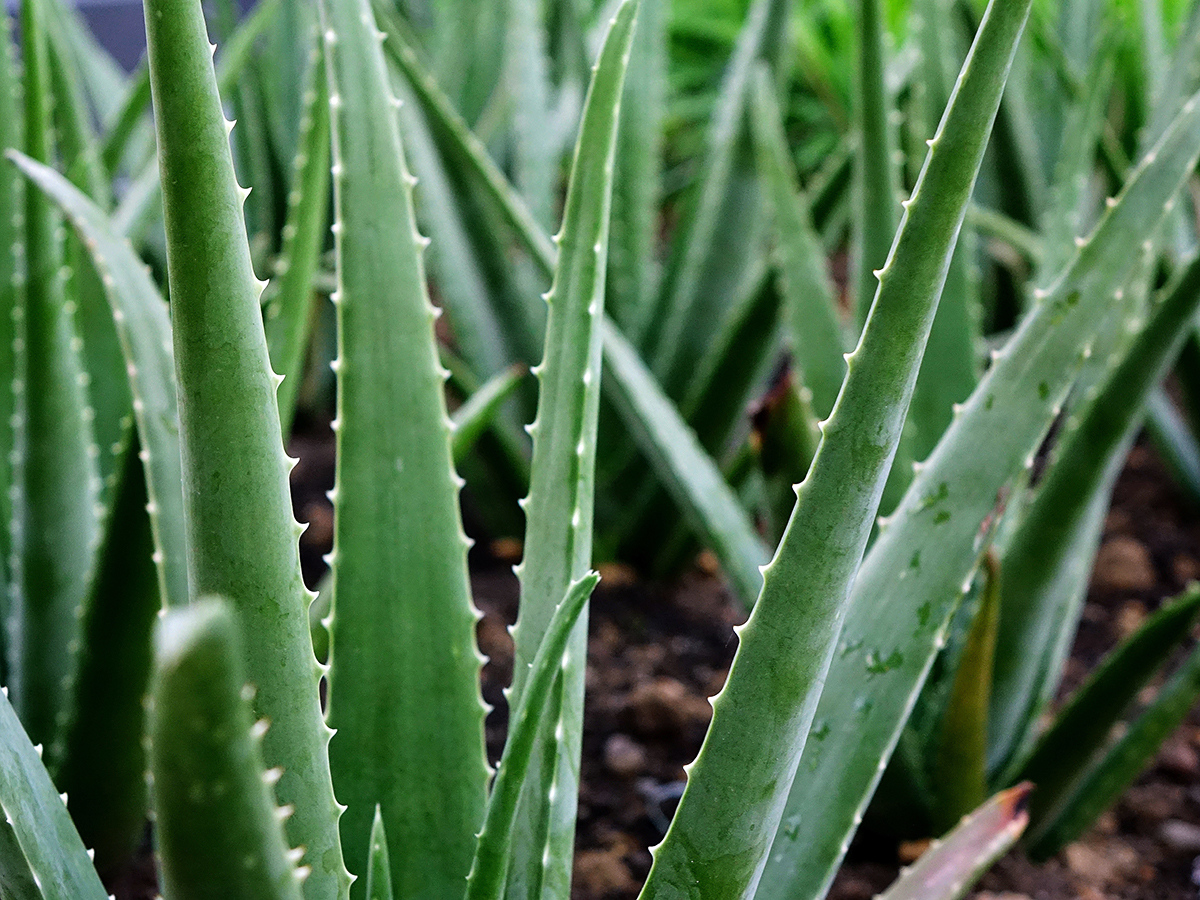
Aloe (Aloe vera) gel
Aloe vera, known as kumari in Sanskrit, is both cleansing and rejuvenating and has a special affinity for the liver. It is one of the best options for balancing pitta dosha and has an overall cooling effect. Aloe vera is purifying and revitalizing for the blood and is indicated when there is evidence of waste build up in the blood, liver, spleen, and gastrointestinal tract. In addition to being part of a holistic liver care plan, this auspicious plant may also be used for regulating issues related to female hormone imbalance and can ease menstrual cramps (Dass, 2013). The outer Aloe vera leaf can be irritating to the digestive system, so it is best to consume the inner filet only as a juice or gel. Aloe vera can be used in 2-4 ounce increments per day.
Concluding Remarks
A holistic liver care plan involves more than taking an occasional herbal tea, tincture, or capsule. The foundation of holistic liver care is a sound diet and lifestyle. Paying attention to smart meal timing, staying hydrated, and eating special liver supportive foods are essential for long-term liver balance. Furthermore, augmenting your holistic liver care plan with herbal allies will make your holistic liver care plan as stellar as your multi-talented, megastar liver!
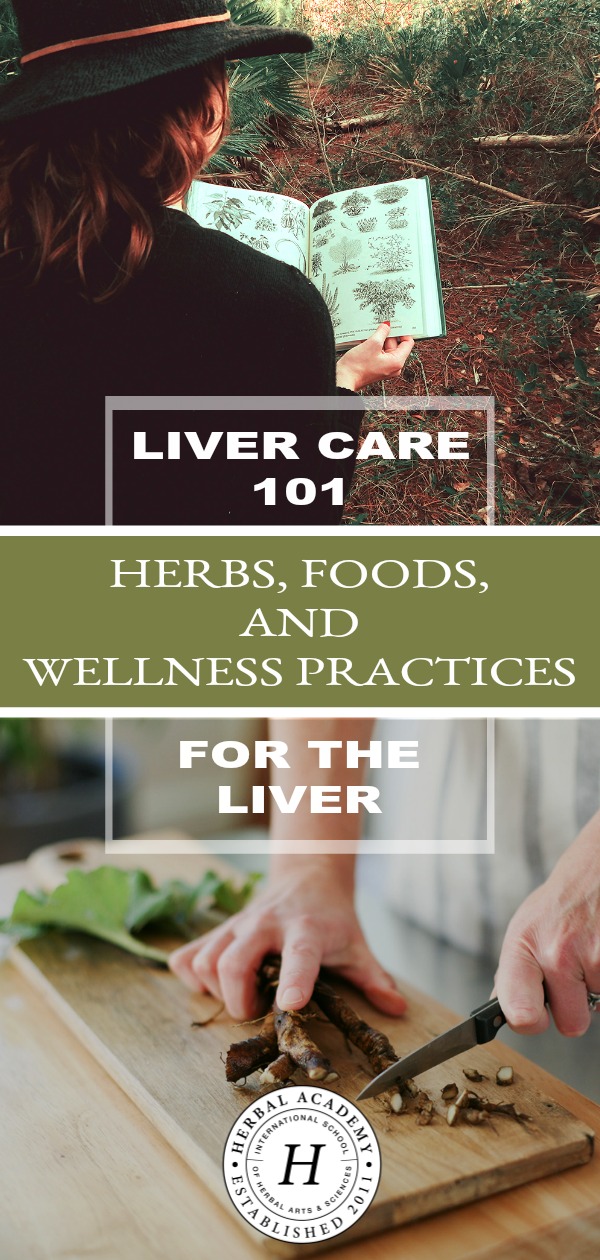
REFERENCES
Dass, V. (2013). Ayurvedic herbology east and west: A practical guide to ayurvedic herbal medicine. Twin Lakes, WI: Lotus Press.
Groves, M. (2016). Body into balance: An herbal guide to holistic self-care. North Adams, MA: Storey Publishing.
Herlihy, B. (2011). The human body in health and illness. St. Louis, MO: Elsevier Saunders.
Keown, D. (2014). The spark in the machine: How the science of acupuncture explains the mysteries of Western medicine. Philadelphia, PA: Singing Dragon.
Palanisamy, A. (2015). The paleovedic diet. New York, NY: Skyhorse Publishing.
Thompson, M. (2019). A practical ayurvedic approach to working with Candida and restoring gut health [Webinar]. Retrieved from https://www.marythompsonayurveda.com/webinar-archive/









